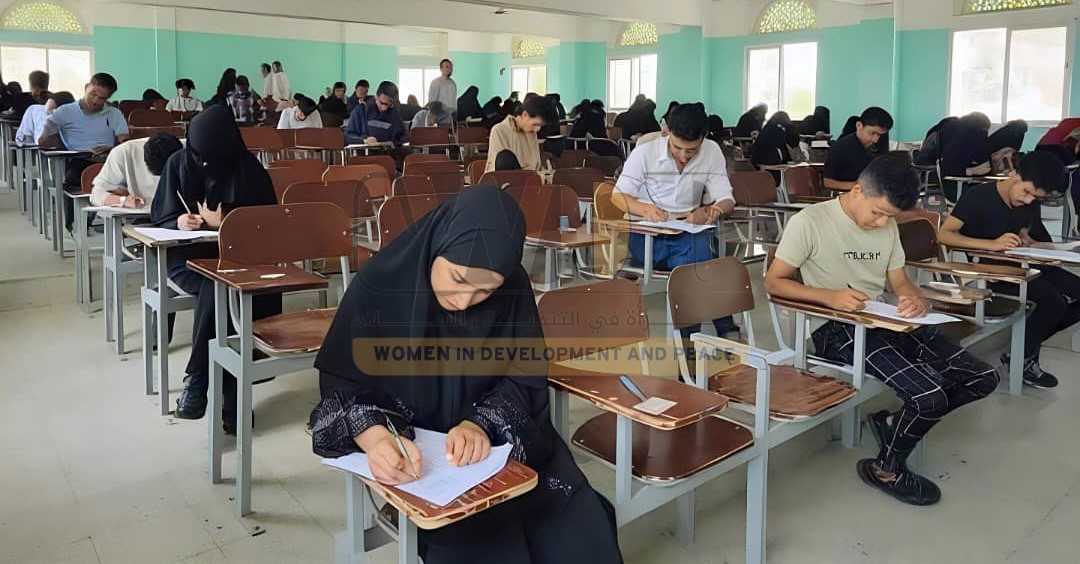Afrah Borji – Women in Development and Peace
Women are the nucleus of society and the cornerstone of progress. They are mothers, educators, sisters, and wives who play a pivotal role in building families and raising generations. Their influence extends to all aspects of life, including higher education and scientific research. Educated women can actively contribute to society’s advancement and progress by acquiring the necessary knowledge and skills, spreading awareness and culture, participating in various fields of work, and bringing about positive change in society.
“The role of men in education has always received great attention, while the role of women and their profound impact on this vital sector is often overlooked.” This was pointed out by Yasmin Qadhi, a graduate student at the University of Science and Technology in Aden.
She said: “Women in higher education are not just teachers or students, but they are a key driver for developing youth skills. They possess unique skills that enable them to empower young people, especially females, and provide them with the necessary tools to face the social challenges that may hinder their educational journey. They can also open new horizons for scientific research, especially in the humanities, such as women’s studies, which have become available at the University of Aden, enriching knowledge and providing new perspectives for understanding the world.”
Qadhi also stresses the importance of equality between the roles of men and women in this educational process, especially in postgraduate studies. She points out that women’s capabilities and potential are no less than men’s, and that they are capable of making a huge positive change in the field of higher education. She emphasizes the need to provide equal opportunities for women to participate in all aspects of the educational process, from teaching and research to administration and decision-making.
Saba Al-Adimi, a dentist and teaching assistant at Al-Hodeidah University, shares her perspective on the role of women and their participation in the higher education sector. She emphasizes the importance of empowering women in this vital field.
Al-Adimi believes that empowering women in higher education and scientific research is a crucial step for several reasons: It enhances women’s capabilities and skills, allowing them to contribute effectively to the development of society on various levels. It contributes to achieving gender equality and breaking down discriminatory barriers against women. It enables women to address issues facing their gender, such as violence against women and early marriage, and find effective solutions. In addition to empowering women enriches society with new ideas and perspectives that contribute to its progress and prosperity.
She also points out that women’s participation in higher education has witnessed significant development in recent years, but more efforts are still needed to ensure equal opportunities and full participation in all aspects of this sector.
Journalist Ismail Al-Aghbari highlights the fundamental importance of women’s education in the life of societies. He indicates that it is the only way to achieve cultural, economic, and social development and has a positive impact on society.
Al-Aghbari believes that education for Yemeni girls, particularly in postgraduate studies, is the cornerstone of progress and change. It represents an investment in human energy and resources in Yemen and a real turning point in creating a conscious and educated society.
He explains that women’s education positively affects future generations by providing them with the knowledge and skills necessary to succeed in life and instilling positive values like responsibility, justice, and tolerance. When we support the education of young men, we support the individual and their families. However, when we support the education of girls and women, we support society as a whole. Investing in a girl’s education is investing in a brighter future for the entire community. As the poet said:
“The mother is a school, if you prepare (educate) her well, you prepare a people of good origins.”
A Prominent Role and Active Participation
Professor Yasmin Qadhi shares her inspiring experience in higher education, highlighting her active role and participation in this vital field. She points out that her journey teaching at the university has only been two years, but she has built strong relationships with her students in that short time.
Qadhi provides an example: In the past, most university professors were older men, making it difficult for students to interact and communicate effectively with them. However, with the increasing number of male and female instructors in universities, students can now communicate more easily and feel comfortable in their presence.
Creating an environment that supports and enhances the importance of women’s education in academia is essential. This will lead to a greater presence of women in postgraduate studies, reduce illiteracy, and raise awareness among women in higher education.

Music enthusiast Salah Al-Was’i asserts that education, especially in Yemen, gives women a strong personality, elevates their status in society, and equips them to serve themselves and their children. Educating a mother or a woman is educating an entire community.
Huwaida Salim explains that the more educated a woman becomes, the more confident she becomes, and the more she gives back to those around her. She raises generations, passing on knowledge and intelligence. Therefore, educating women in higher education and scientific research is necessary to enhance innovation, creativity, progress, achievement, and to achieve equality and justice with men, which contributes to the sustainable development of societies.
A Youthful Perspective Filled with Positivity
Women play a vital role in building and advancing societies. Therefore, enhancing their academic education participation is essential for sustainable development. Youth can play a positive role in this field through various initiatives and activities.
Youth can significantly contribute to providing opportunities for women to pursue higher education. This can be achieved by: Supporting scholarship programs in colleges, providing volunteering and cooperative work opportunities, and participating in awareness and educational campaigns. Moreover, youth can benefit from women’s experiences and talents by collaborating with them on research and academic projects and offering support in technology and innovation.
Huwaida Salim emphasizes the importance of youth’s role in strengthening women’s participation in academic education. She points out that providing opportunities for women to pursue higher education, along with offering support and encouragement, serves as a significant motivator, contributing to their empowerment and achievement of their goals.
Al-Was’i highlights the significance of youth’s role in promoting women’s participation in academic education through initiatives that empower women. Examples include establishing associations that provide financial support to women through scholarships.

Similarly, media personality Alaa Faqira emphasizes the crucial role that youth play in enhancing women’s academic participation, particularly in light of technological advancements and growing awareness of the importance of women’s education.
He highlights that fathers, brothers, and husbands have become more supportive of women in their educational journeys, both financially and morally. Youth are increasingly aware of the importance of women’s education and view academic degrees as a tool for women to face life’s challenges, whether married or not.
He explains that youth are more focused on women’s education, not only for their benefit but also to empower them to contribute to raising children and supporting families in the future. Educated fathers, brothers, and husbands insist on women pursuing education and obtaining degrees, recognizing education as a weapon in their hands to face life’s circumstances.
“Therefore, the support and encouragement women receive from their male family members enable them to achieve what men in the same family might not, driving them towards achievement and scientific progress, ultimately becoming active and influential women in society,” states Faqira.
Challenges
“Yemeni women, amidst the ongoing conflict and deteriorating economic conditions, face numerous challenges hindering their pursuit of higher education. These challenges are particularly severe for women, being the most vulnerable group in society, despite their strength and immense potential,” notes Al-Was’i.
Media personality Faqira adds: “The economic circumstances women face within their families, the ongoing conflict, and the deteriorating living conditions for many families have led to fewer job opportunities and increased unemployment rates in Yemeni society. All of this has been a major reason for many women not completing their university education.”
Huwaida Salim outlines the challenges women face, summarizing them in three main points: Customs and traditions: Women in rural areas are disproportionately affected, and often prohibited from pursuing higher education, thus marginalizing their potential. Persistent societal views on women’s roles and lack of gender equality. Financial challenges that contribute to low family income significantly impact girls’ education. This is often due to the country’s situation and the high cost of living.
Al-Aghbari emphasizes that women and girls face numerous difficulties and challenges in education and employment. He highlights the patriarchal authority that dictates the types of specializations and jobs women are allowed to pursue as a major obstacle.
He notes that while there are no specific solutions to these difficulties, women and girls are determined to challenge and overcome them. They defy societal norms and traditions imposed on them, whether by family, society, or religion.
He explained that among the most prominent challenges are: Lack of encouragement for girls’ education compared to boys. Restrictions on traveling to distant areas to pursue desired education. Deep-rooted poverty deprives women of education and pushes them towards work or early marriage, especially in conservative families.
Al-Aghbari emphasizes that these challenges require a collective effort from the entire female community to confront these limitations. This collective action is crucial to break free from restrictions that hinder women’s aspirations and limit their academic and professional participation.
Solutions
Regarding solutions to influence communities and enable women to continue their education, Huwaida Salim states: “It is essential to support women morally and financially in pursuing their education through various means, such as initiatives, activities, events, awareness campaigns, and other methods. Financial support should be integrated as a partner in achieving this goal. Additionally, it’s crucial to increase job opportunities and ensure fair employment for women after completing their education. This can be achieved by strengthening partnerships and collaboration between academic and community institutions to support women’s empowerment. By doing so, many obstacles facing Yemeni women can be overcome, creating a supportive environment for their academic journey and enabling them to achieve their scientific and research aspirations.”
From Alaa Faqira’s perspective, improving the economic situation and providing salaries to employees will significantly contribute to women completing their education.
He adds: “It is imperative to provide job opportunities for women to enable them to contribute to their families and alleviate difficult economic situations. It is no secret that entering public universities has become challenging, leading many young men and women to pursue private higher education, which requires significant financial resources. Therefore, providing job opportunities is crucial for women to afford their educational expenses.”
Salah Al-Was’i concludes by saying: “One of the most critical solutions and modern approaches to developing women’s role in education and scientific research is establishing programs for women’s empowerment.”
Many news reports suggest that the government should provide free educational opportunities for girls at all levels, including higher education, and combat poverty through programs to support poor families. Additionally, the government, society, and local and international organizations should work to provide employment opportunities for women, helping them finance their education. There should also be an increase in opportunities for women to receive scholarships. Programs for female education should be supported, as they help women overcome the challenges they face.

